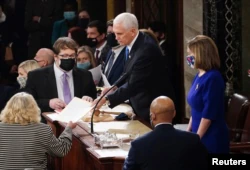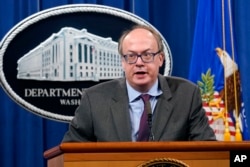The congressional panel investigating the January 6 riot at the U.S. Capitol last year is set to hear testimony Tuesday from Cassidy Hutchinson, an aide to former President Donald Trump’s chief of staff Mark Meadows, who was privy to key White House conversations as Trump sought to upend his 2020 election loss.
Watch the hearing live:
Hutchinson’s testimony is shrouded in secrecy and was hastily scheduled Monday, with the House of Representatives panel declining to identify her publicly and saying only that a surprise hearing would be held “to present recently obtained evidence.”
Multiple U.S. news outlets identified her as the new public witness, although the panel has previously shown snippets of her videotaped testimony from three private depositions she gave to the committee’s investigators.
In one brief segment, she testified that a half dozen Republican congressmen sought pardons against possible criminal prosecution from Trump before he left office. All had played roles in promoting his debunked claims that vote-counting fraud had cheated him out of a second term in the White House. Trump pardoned a handful of political aides as left office but not the House Republicans.
The investigative panel, after five hearings earlier this month, had previously said its next public hearings would not be held until mid-July. One of those hearings is set to detail the involvement of right-wing extremists in the insurrection at the Capitol and the other to explore what Trump was doing at the White House as he watched the riot unfold on television for more than three hours, ignoring entreaties from family members and associates to tell the rioters to leave the Capitol.
Previously, an array of witnesses, in taped testimony and in person before the panel, have described how Trump and his allies sought to pressure former Vice President Mike Pence, the Justice Department and state officials to upend the congressional certification of the election results on January 6, 2021.
Trump staged a rally near the White House shortly before the mayhem at the Capitol, urging his supporters to “fight like hell” to block congressional approval of Democrat Joe Biden’s victory.
About 2,000 of Trump’s supporters stormed past law enforcement officials into the Capitol, ransacking congressional offices, vandalizing the building and scuffling with police. More than 800 have subsequently been charged with offenses and more than 300 have pleaded guilty or been convicted in trials. Sentences have ranged from a few weeks in prison to more than four years.
Some of the rioters shouted, “Hang Mike Pence!” in protest of the former vice president’s refusal to block certification of the election results in several states Trump narrowly lost. Trump wanted the official results sent back to those states so state legislators could then name electors supporting Trump rather than Biden.
During one of the hearings last week, the committee played a video clip of Hutchinson testifying that Meadows and a Trump attorney, former New York Mayor Rudy Giuliani, held conversations about putting together fake slates of electors supporting Trump, part of the former president’s broad effort to change the election outcome.
News outlets have also reported that during one of her interviews with the committee, Hutchinson said Trump had approved of the “hang Mike Pence” chants from the rioters who stormed the U.S. Capitol and was dismayed that Pence’s security detail had rushed him to safety as the rioters came within 40 feet (12 meters) of reaching him. Trump supporters erected a gallows on the National Mall within view of the Capitol.
In the United States, presidents are effectively chosen in separate elections in each of the 50 states, not through the national popular vote. Each state’s number of electoral votes is dependent on its population, with the biggest states holding the most sway. The rioters who stormed the Capitol tried to keep lawmakers from certifying Biden’s eventual 306-232 victory in the Electoral College.
While the House committee cannot bring criminal charges, the Department of Justice is closely monitoring the hearings to determine whether anyone, Trump included, should be charged with illegally trying to reverse the outcome.
Last week, FBI agents raided the suburban Virginia home of a former assistant attorney general, Jeffrey Clark, who wanted Trump to name him attorney general in the last month of his presidency so he could advance Trump’s erroneous claims of vote fraud.
Trump appeared willing to make the appointment but backed off when top Justice Department officials said Clark, an environmental lawyer, was not qualified to be the country’s top law enforcement official and threatened to quit en masse if he were named.
In addition, FBI agents, in a separate encounter in the southwestern state of New Mexico, seized the cell phone of conservative lawyer John Eastman, a Trump supporter who pushed for the plan to name bogus electors supporting Trump in the states where Trump narrowly lost the vote counts.
A prosecutor in Atlanta, the capital of the state of Georgia, has convened a grand jury to probe Trump’s effort to overturn the vote in that state. Trump asked the state’s top election official, Brad Raffensperger, to find him 11,780 votes — one more than Biden defeated him by — out of 5 million ballots.
The investigative panel has heard testimony that key Trump aides told him he had lost the election and that there were minimal voting irregularities, not enough to overturn Biden’s Electoral College victory.
In addition, Trump was told it would be illegal for Pence to unilaterally block Biden’s victory as Pence presided over the congressional Electoral College vote count, as Trump privately and publicly implored the vice president to do.


